#excerpted collateral director's commentary as transcribed by yours truly :)
Text
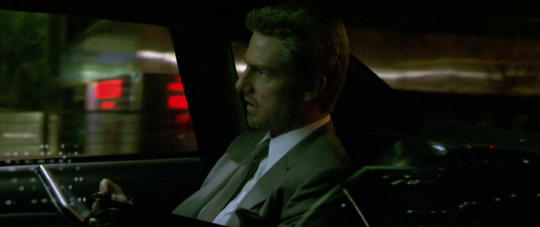
In fact the backstory of Tom in the film is that in the offshore world of narco trafficking cartels, they have the budgets to buy the best and they do. Particularly since the end of the Cold War, when that market has become available, people that are ex-KGB, ex-Stasi, as well as Brits and Americans from special forces; Israelis.
Since we’re only in these ten hours, we’re only seeing a fraction of a whole life. And since we’re only ten hours, the challenge is can I design those fractions that they become glimpses… that you kind of sense the person. To do that, one has to invent the history of Vincent, the history of Max, and then to choose those details to put in the ten hours of tonight. [...] The film does not do what a life experience of these ten hours would not do, which is to have exposition or to travel backwards in time via flashbacks or any of those other devices. But instead just to keep it as immediate, into this presence, and yet to have a greater degree of knowingness into their lives.
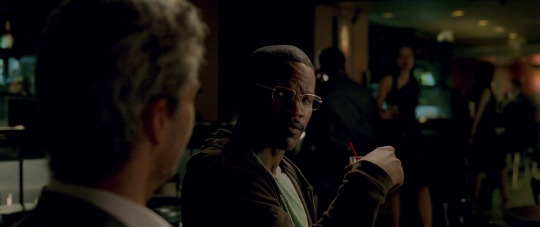
Vincent is somebody who’s decisive… who’s embraced force as a way of controlling his environment, as a way of — and I don’t think Vincent is actually actively aware of this — but it’s a way of controlling an environment so that bad things don’t happen to him. He, consequently, can be someone who’s improvisational, he’s highly trained, he takes action, he has opinions. Max is exactly the opposite.
The other aspect about Vincent’s appearance is again, and building the character, how to make these two characters be oppositional, what Vincent’s chosen to wear, it tells us things — I believe that audiences are much brighter than they are aware of, there’s a lot of information they take in on a feeling level. There’s a cut to his suit that says perhaps it was custom tailored, but not in Milan or London or New York, in my mind it was Kowloon. The thing about his hair, scars on his hand, scars on his face.
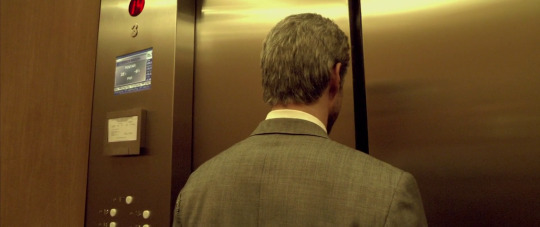
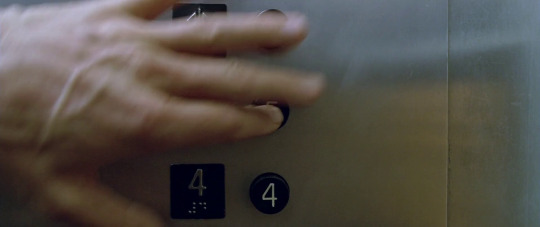
In effect he’s a rough trade in a good suit. Prematurely gray, kind of a steely aspect to him. Those are design issues that are there to tell us, tell the audience, tell YOU things about who he is on a feeling level, not anything that is didactic or spoken to you. It was tricky to arrive at some of these looks and some of these issues because — and this is also the challenge of the film that made it very exciting to me, to do it and want to do it — which is that when you compress the time frame, of a narrative and it’s under two hours, and you’re just in one locale, you’re one night, it also means there’s going to be one suit and one wardrobe change and everything’s going to become inordinately important. Driving a race car, a very small input in steering has a radical effect. So the slightest change, because it’s cumulative, becomes a big deal.
But the deep work that goes into this kind of thing is in fact how did Vincent become Vincent. And Tom and I did a lot of work in trying to understand where this guy came from. If he was in a foster home for part of his time, if he had an institutionalized childhood. And if he was back in the public school system by age 11, that would have been sometime in the 1970s. He would have been dressed very awkwardly. He probably would have been ostracized, because he would have looked odd and you know… the brutality of preteens and early adolescents.

We postulated an alcoholic, abusive father who was culturally very progressive. He was probably part of Ed Solowski’s steelworkers local in Gary. He was a Vietnam veteran. He had friends who were African American, the South Side of Chicago, the Checkerboard Lounge is 30 minutes away in a cab, Calumet Skyway. So the father in his sixties and early seventies was probably an aficionado of jazz, there was a great jazz scene on the South Side of Chicago, modern jazz quartet… it’s almost as if the father blamed the son I.E. Vincent for what happened to the mother, and the father drank and Gary was being reduced to — I mean it looked like Dresden at the end of the war. The father never tutored the boy in jazz. But the boy extolled the virtue of knowing about jazz because he heard his father talk about jazz, not to him, but to other people. And that’s why he knew about jazz, and that’s why he learned about jazz.
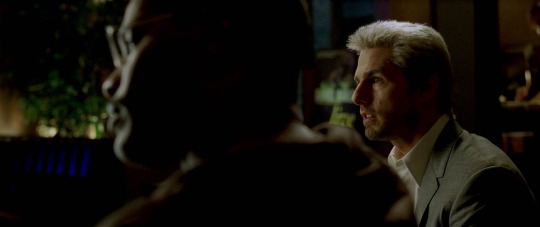
Now his father, Vincent’s father, never tutored Vincent about jazz because he had rejected his son. And ignored him. It was something that got constructed as backstory and the work I did with Tom during pre-production and understanding every aspect of the character of who Vincent was, much more than it appears in the text of the film so that the fractions of Vincent-ness that we have IN the text of the film, within these ten hours, could resonate with the totality of a life the same as they would with anybody you met. We all bring a whole history with us into the moment of the present.
#excerpted collateral director's commentary as transcribed by yours truly :)#collateral 2004#collateral (2004)#tom cruise#jamie foxx#michael mann
90 notes
·
View notes